Every year, hundreds of publications, dissertations, and scientific conference papers are written using data from the American National Election Studies (ANES). The ANES has had a profound impact on the study of American political attitudes and behavior and the work of generations of scholars who have used this national resource. In recognition of the 75th anniversary of the American National Election Studies (ANES), the Center for Political Studies reached out to a few of those scholars to reflect on how the ANES impacted their research.
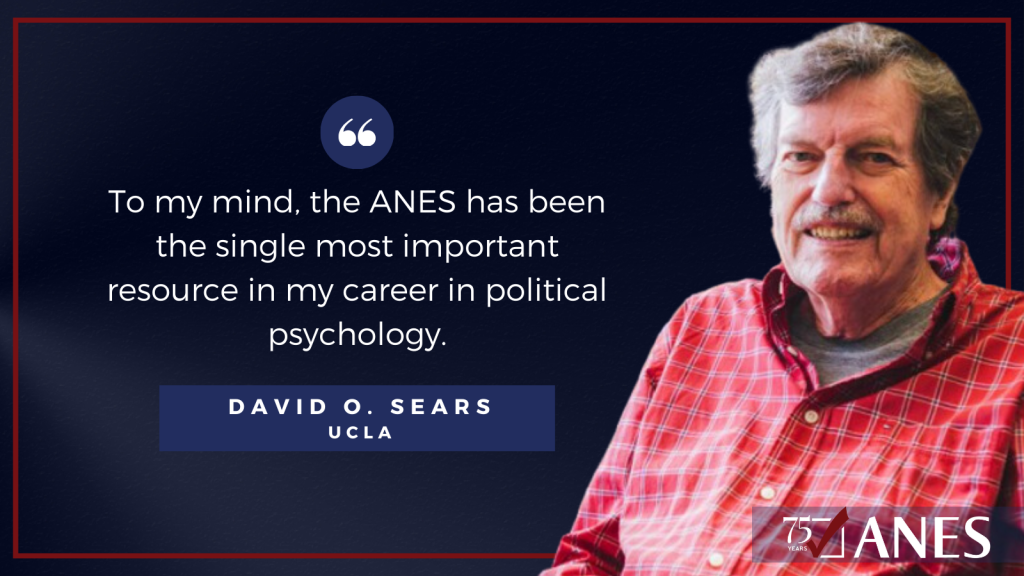
“To my mind, the ANES has been the single most important resource in my career in political psychology.”
–David O. Sears, Distinguished Professor Emeritus, UCLA
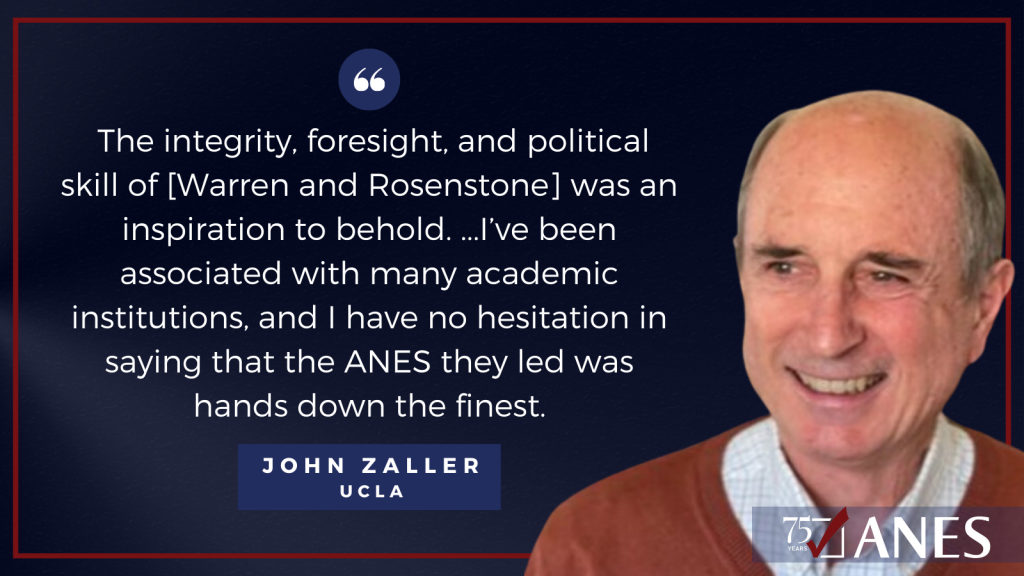
“When I was a graduate student in the 1970s I thought the study of American democracy was the study of public opinion and the study of public opinion was working with ANES data. My favorite party game was “Michigan Marginals” – competitive guessing the response distributions to questions in the NES codebooks. I’m older now and enthusiastic about different things, but I still believe the ANES is one of the world’s finest social science institutions, with its greatness only growing as the Time Series extends. I was incredibly lucky to have ANES data for my dissertation and later work, as have been hundreds of others.
“I would like also to say a few words about Warren Miller and Steve Rosenstone, the leaders of ANES in its formative period. I knew them at close range as a member of the ANES Board of Overseers and am still in awe. A couple of anecdotes: ANES data were released to the public at a set time and no one, not even Warren Miller, could peek ahead of time. I still remember him hovering nervously over a new data release, waiting until the clock reached noon to flop open the book to see how the numbers for his beloved variable, Party Identification, had been affected by the recent election. And Steve Rosenstone, a scholar of turnout, leading a study that concluded ANES’s investment in validated vote report was creating as many errors as it was correcting and should be terminated. The integrity, foresight, and political skill of these two leaders was an inspiration to behold. Near the end of my career now, I’ve been associated with many academic institutions, and I have no hesitation in saying that the ANES they led was hands down the finest.
“And can I end a tribute to ANES without mentioning Phil Converse, the greatest scholar of anything I know about? I never really knew him, but I wouldn’t be me without him.”
– John Zaller, Professor Emeritus of Political Science, UCLA
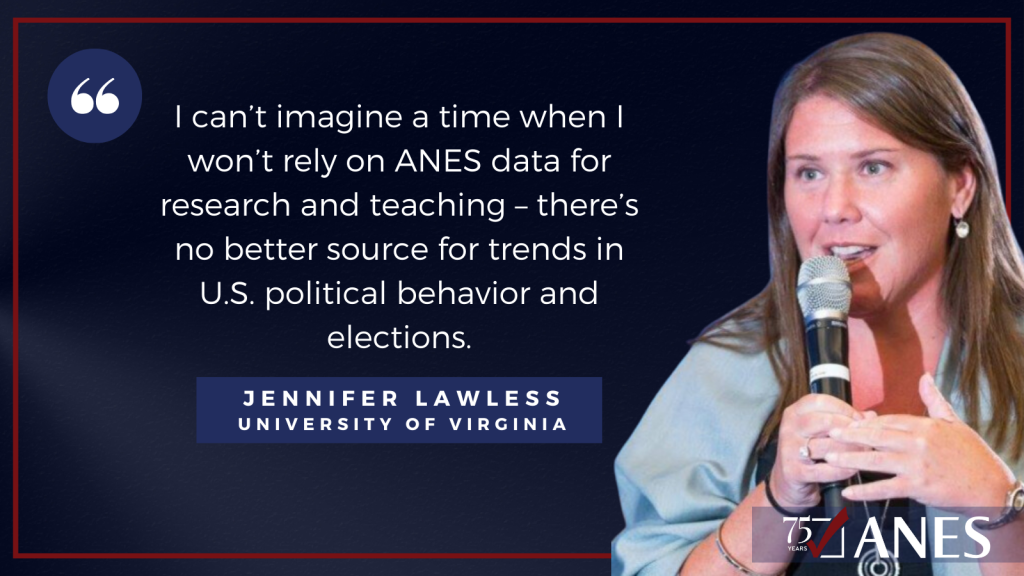
“I will forever be indebted to the ANES. Data from the cumulative file served as the basis of one of my dissertation essays, as well as my first solo-authored publication. It’s not an exaggeration, then, to say that the ANES played a big role in landing me my first (dream) job at Brown. That’s among the many reasons I was honored to serve on the Board for the 2016 election cycle. I can’t imagine a time when I won’t rely on ANES data for research and teaching – there’s no better source for trends in U.S. political behavior and elections.”
– Jennifer Lawless, the Leone Reaves and George W. Spicer Professor of Politics and Professor of Public Policy, University of Virginia
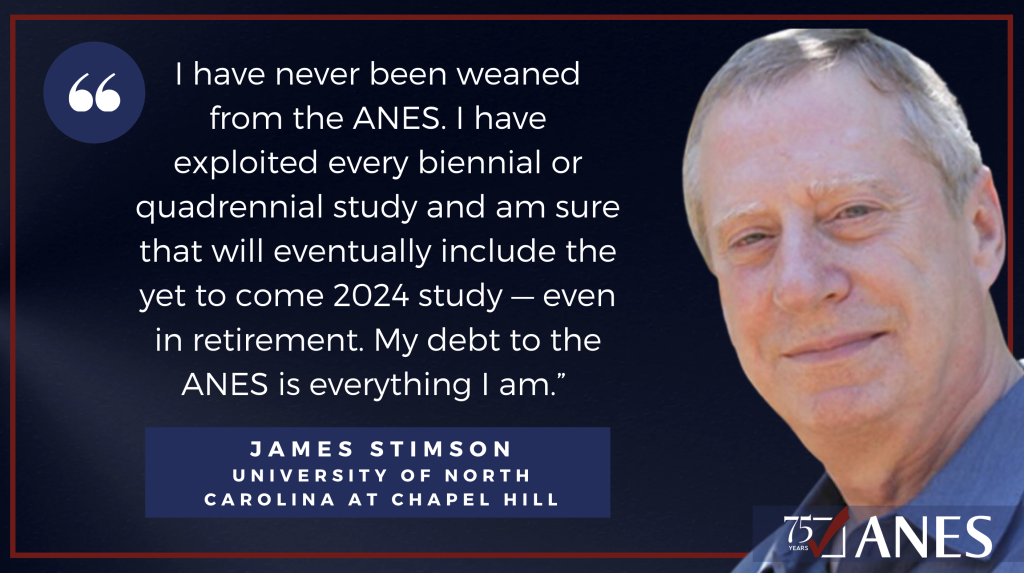
“I became a behavioral political scientist that day in the early 1960s when I first touched an “analysis deck” of the 1956 Michigan Election Study (not yet called ANES). Sixty or so years later the excitement of that moment is still with me. A fourth of a continent away from Ann Arbor and as an undergraduate I could test ideas that, at least so far as I knew, had never occurred to anybody before. My testbed then was the novel instrument called the counter-sorter and the method was literal cross-tabulation. I immediately began to think of myself as a voting behavior analyst, even before graduate school. And it stuck. Even though my scholarly trajectory has switched away from the micro behavior questions that initially motivated me, I have never been weaned from the ANES. I have exploited every biennial or quadrennial study and am sure that will eventually include the yet to come 2024 study — even in retirement. My debt to the ANES is everything I am.”
– James Stimson, Raymond Dawson Distinguished Bicentennial Professor of Political Science Emeritus, University of North Carolina at Chapel Hill
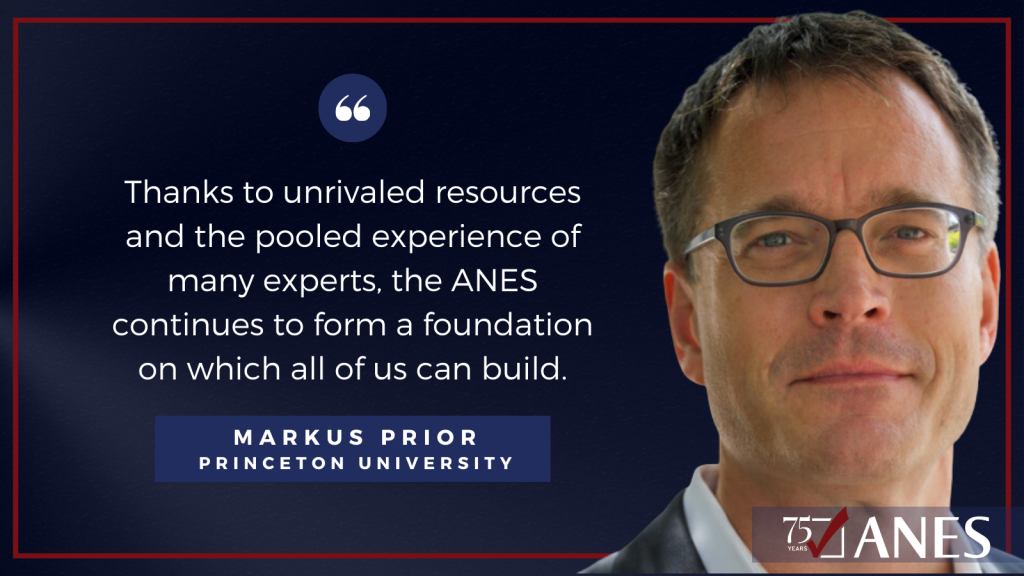
“Directly observing political behavior is important and often the most valid measurement—but we also need to understand what goes on in people’s heads. For that, surveys are indispensable. But not every survey is the same. The ANES provides a long-running, credible benchmark for many survey-based measurements in political science. Its historical value can’t be argued with, yet its significance in contemporary political science is just as great: Thanks to unrivaled resources and the pooled experience of many experts, the ANES continues to form a foundation on which all of us can build.”
– Markus Prior, Professor of Politics and Public Affairs at Princeton University
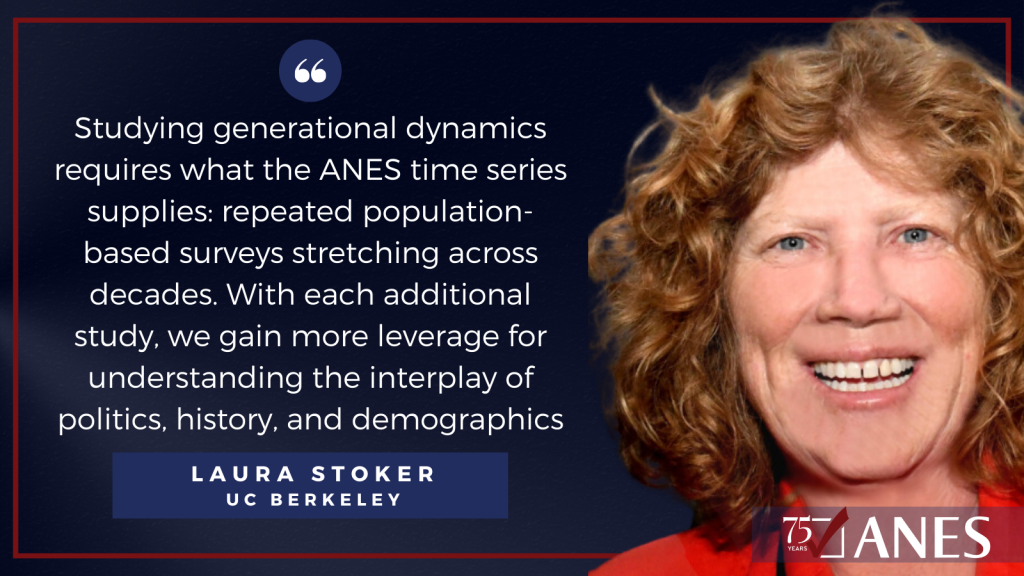
“The ANES time series has been invaluable to my research—at that of many other social scientists—on generations. This research focuses on whether Americans differ depending on when they were born and what they experienced when coming of age, and on whether generational replacement is fueling social and political trends, such as partisan realignment and dealignment; declining civic engagement, political participation, and trust; and growing secularism, liberalism, egalitarianism, and polarization. Studying generational dynamics requires what the ANES time series supplies: repeated population-based surveys stretching across decades. With each additional study, we gain more leverage for understanding the interplay of politics, history, and demographics.”
– Laura Stoker, Professor Emerita of the Graduate School in the Department of Political Science at the University of California, Berkeley
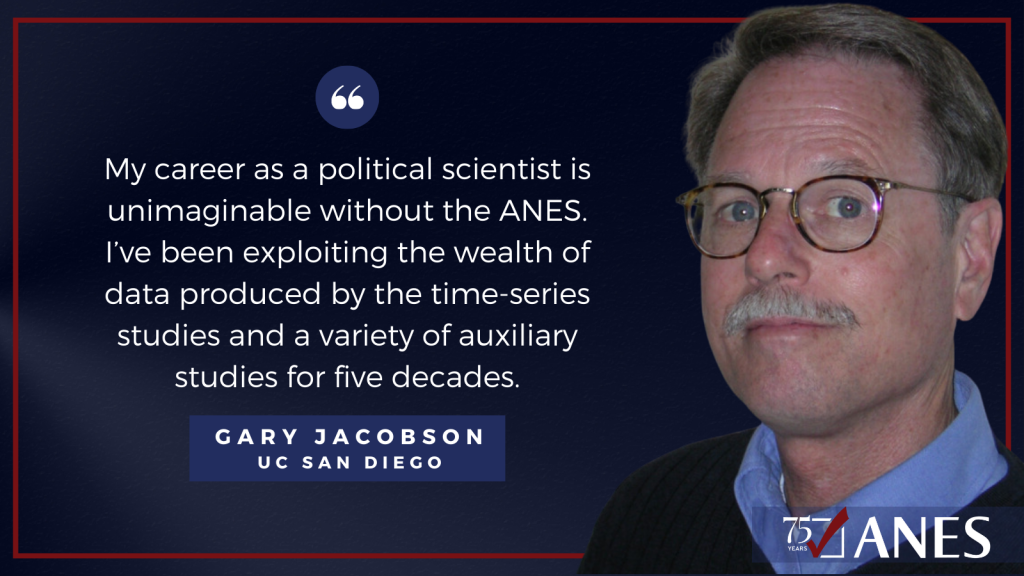
“My career as a political scientist is unimaginable without the ANES. I’ve been exploiting the wealth of data produced by the time-series studies and a variety of auxiliary studies for five decades. I’ve used them for dozens of journal articles, from my earliest in the 1970s through this year. NES* data were a prime inspiration for, and remain a core component of, The Politics of Congressional Elections, now in its 11th edition, and they have been important to my two more recent books on public opinion and the presidency. I doubt there are many more avid consumers of ANES data.
“Equally if not more important to my professional life was my involvement in helping to produce the data. I was toiling in obscurity as an assistant professor at Trinity College, working on a project that had me appending campaign spending data to NES data (using self-typed punch cards) and had the idea that the survey would be greatly enhanced (and my workload greatly reduced) if the studies included contextual data—on such things as campaign expenditures in the respondent’s district, of course—along with the survey data. My mentor, Dave Mayhew, suggested I make a proposal for the 1977 NES conference that would be considering ways to investigate congressional elections. I did, was invited to the conference, and ended up on the NES Committee on Congressional Election Research for the next decade, eventually chairing it. Later, I also served on the NES Board of Overseers and in that capacity chaired the committee that designed the 1990 Senate Election Study.
“From the beginning, working with NES was a fantastic experience. Not only did I get to see some of my ideas (usually greatly improved) work their way in to study designs and questionnaires that became the data I later analyzed, I also got to work with and befriend the finest election scholars from three generations: my heroes from the generation of Warren Miller and The American Voter, the hot shots of my own cohort, and a younger group of budding academic stars telling us how to get election studies right. Many became lifelong friends. If I tried to name them all I would use up all my space (for reference, most are thanked in the prefaces to PCE). I got a lot of my education as a social scientist well after graduate school, and my involvement with the ANES community was at the heart of it.”
*The ANES was known as the National Election Studies (NES) from 1977 to 2005.
– Gary Jacobson, Distinguished Emeritus Professor of Political Science, UC San Diego
This post is part of a series celebrating the 75th anniversary of the American National Election Studies (ANES). It was developed by Tevah Platt.
For a future post, we’re interested in your input on what the ANES has revealed about key moments, decades, or patterns in American history. Tell us what you think with this quick Google form.


